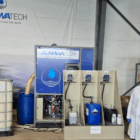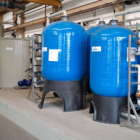Grease separator
Grease separators are specialized systems for separating and retaining fats, oils and other floatable substances from wastewater streams. These separators are mainly used in industries such as food processing, catering, slaughterhouses and other trades where wastewater containing grease is produced. The grease separator is used to reduce the load on wastewater treatment plants,







